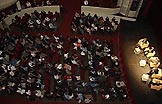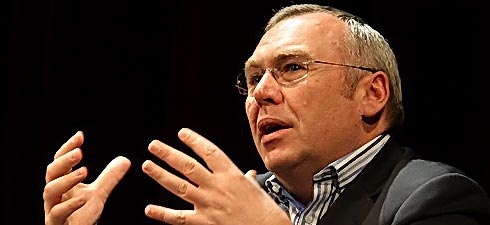Allianz.com News: What do you think are the most important steps at the moment to accelerate the process of European integration?
Gusenbauer: Getting the Treaty of Lisbon ratified is a very important step in the European integration process. Austria and a large number of other member states have done it already. It will be interesting to see how ratification goes in Ireland, where they also have a referendum pending.
At the moment, I don’t think it’s wise the way some governments are discussing how to fill positions like the President of the European Council or the High Representative for Foreign Policy. I think it’s more reasonable to wait for the results of the elections to the European Parliament.
Outside Europe, we’re facing a wide variety of global challenges on which Europe has to take action – just to take one example, the rise in the cost of food worldwide. Here it makes sense for us to contribute jointly toward a solution as Europeans.
Internally, we have to strengthen Europe as a social entity. The reforms of the past few years have had good results. We’ve created about 19 million new jobs in Europe in the last ten years, six million in the last three years alone. But the crisis in the financial markets raises the threat of an economic downturn. For that reason too, we need to establish more of the fundamental social rights in the EU.
Austrian Chancellor: "Strengthen Europe as a social entity"


Austrian Chancellor Alfred Gusenbauer at the podium
What have Austria’s special achievements been in the process of developing a shared European identity?
Gusenbauer: Austria is situated halfway between old Europe and new Europe. We see ourselves as a kind of hinge. As Austrians, we can help improve understanding in both directions. We can carry a European perspective into the Balkans, and can also serve as a conduit to communicate their needs to Europe.
What do you think international corporations like Allianz can contribute toward a shared Europe, and to create a European public?
Gusenbauer: Large corporations can make an important contribution toward creating a European public – both nationally and internationally. The event here at the Vienna Burgtheater [ed. note: the "Let’s Talk about Europe" series initiated by the Allianz Cultural Foundation] is a very good example of a European approach that should also be carried to other countries.
What do you think Europe will be like in 2020?
Gusenbauer: Europe today is undergoing major changes, and is repositioning itself. Europe is characterized by a specific European social model. This path of working together, of social justice and dialogue, will become even better established in Europe, and will also become one of our continent’s most important exports.
The new Charter of Fundamental Rights has already changed the face of Europe. It provides an anchor for fundamental social rights that are unknown to the Austrian constitution, for example. It will further social justice in Europe. And most especially, how fast an overlying European identity develops and takes root alongside the national and local identities already in place will depend on the success of social policies and tangible outcomes in climate protection.
Climate protection is an issue that concerns everyone. The EU can meet this global challenge only by acting together. But a well-designed climate policy is also an opportunity for greater economic growth, and will make a significant contribution toward strengthening the European economy. New environmental technologies and investments will increase our growth potential and create new jobs, which might allow us to achieve full employment within a few years.